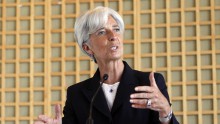On April 18, we learned that Ukraine had a new chance to get back on track its four-year program with the IMF. When meeting with the Ukrainian delegation during the spring meeting of the Fund and the World Bank’s leadership in Washington, the IMF’s head Christine Lagarde said that the IMF mission would soon visit our country. “Lagarde stressed the Fund’s readiness to continue supporting our country on the path of economic change,” the Embassy of Ukraine in the US reported after the meeting. However, the head of the Ukrainian delegation, chairperson of the National Bank Valeria Hontareva, was more cautious on the issue, and even highly self-critical. She stressed that Ukraine needed urgent action to implement reforms envisaged by the program of cooperation with the IMF.
Let us recall that the IMF’s EFF program for Ukraine, which started in March 2015 and involves loans amounting to 12.348 billion SDR, or about 17 billion US dollars, originally envisaged disbursing four tranches to the Ukrainian government in 2015, and another four in 2016 (each tranche following a quarterly review of the program). But so far, we have received only two tranches, amounting to 5 billion and 1.7 billion US dollars respectively. The program was effectively put on hold last fall.
The IMF’s representatives have repeatedly stated that the Fund awaits clarity on the situation around Ukraine’s Cabinet and coalition stability. To complete the second review of the EFF program and get the third tranche disbursed, Ukraine is asked to strengthen the fight against corruption and demonstrate willingness to continue reforms.
Will Ukraine fulfill these requirements anytime soon? In answering this question, Doctor of Economics, Professor Oleksii Plotnykov told The Day: “Unfortunately, I feel rather pessimistic about it. We still do not know the contents of the new version of the memorandum, which probably says that Ukraine has to commit to further tariff increases, raising the retirement age and other very unpopular things. And given the fact that we have a new Cabinet, I assume that the new prime minister will seek to get favor with the Ukrainians by supposedly populist steps like lowering or at least stabilizing tariffs and abolition of the pension tax. But this does not correlate with the demands of the IMF in the slightest. So, the arrival of the mission is most likely due to the Fund’s desire to get acquainted with the new Cabinet and ministers, and it is unlikely that the new Cabinet will meet IMF demands during the visit of the mission. As to this, I have very serious doubts.”







